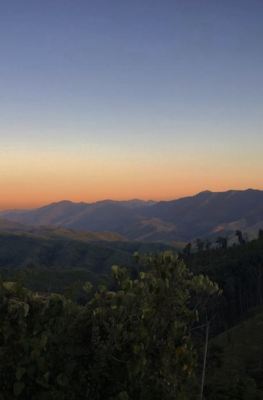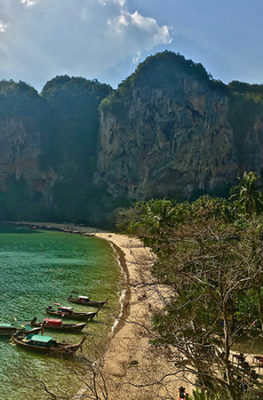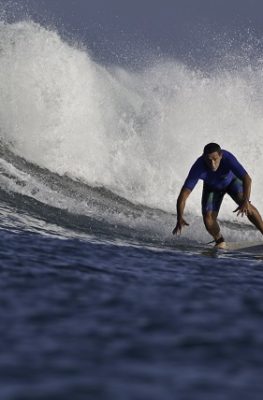Published on July 6, 2014
Only days ahead of Indonesia’s crucial Presidential Elections to be held on Wednesday, 9th July, one will not even notice that such an important event will be happening this coming week except for banners stretched across road sides or traffic islands urging people to vote for Prabowo-Hatta or Jokowi-JK the two contending presidential candidate- teams. Otherwise, traffic and activities just continue in a business as usual mode.
It also so happens that this is now the Ramadhan fasting month, when the majority of Indonesia’s population fasts and restrains from violence and evil deeds.
On 9 July, – on that one morning only- over 190 million Indonesians across the entire archipelago from Aceh in the West to Papua in the East will together go to the polls to decide who of either candidates will be the nation’s next President.
For this reason Wednesday, 9 July has been declared a public holiday, where even all banks will be closed.
Thousands of polling stations from large cities to small villages high up on mountain tops to far away on remote islands, are all ready to receive voters, who will line up patiently to cast their precious individual ballots to decide who will be Indonesia’s next President for the 2014-2019 term.
Voting stations will be open from 07.00 hrs until 13.00 hrs. local time, at which moment all ballot boxes will be closed, ballot papers counted, and the actual counting of votes begins, witnessed by the public. Meantime results of Exit Surveys by different research organizations – here known as Quck Count – will start to be aired on Television and social media. The possible winner will already be known, but who will be the positive winner must wait for the official Real Count results, which will be published only after one month.
This is the third time that Indonesia holds direct Presidential elections. Previously, the President and Vice President were chosen by the People’s Representative Conggress, MPR. The two previous presidential elections being in 2004 and 2009. President Soesilo Bambang Yudhoyono who won the past two elections, is, under Indonesian Legislation no longer eligible to run for a third term.
Unlike previous elections, this year only two contending teams are vying for the Presidential seat, and these are : at Number 1 : Prabowo Subiyanto-Hatta Rajasa, and at No. 2 are Joko Widodo – Jusuf Kalla. Prabowo Subiyanto was onetime Commander of Indonesia’s Special Forces, Kopassus, running for President with running mate Hatta Rajasa, former Coordinating Minister for the Economy, as Vice President. Running at No. 2, is Joko Widodo, Governor of Jakarta as candidate President and Jusuf Kalla, former Vice President, as running mate for Vice President.
On Friday, 4 July, the Constitutional Court ruled that since there are only teams running, there will be only one round of elections. This means to that whoever wins the highest number of national votes, will automatically become President . This diverges from earlier election rules where, to be elected President, the team must win at least 50% + 1 of national votes, with a minimum 20% of votes in each province.
Many experts concede that the Indonesian system of democratic general elections and presidential elections must, indeed, be the most complicated in the world. However this may be, so far it has proven to work across this sprawling archipelago.
The Process from General Elections to Presidential Elections 2014
On 9 April 2014, in the General Elections, Indonesians were asked to vote among 15 political parties, and who of their favored lawmakers would sit in National Parliament and regional parliaments. Contending parties were those able to show a minimum of 3.5% electoral threshold. Parties who gained 25% of popular votes or a minimum 20% of seats in Parliament would be eligible to nominate a Presidential Candidate with Vice Presidential running mate in the 9 July Presidential Elections.
Results of the General Elections, however, showed that this year, not one single party had managed to achieve the minimal requirement . This meant that political parties were forced to form coalitions to be eligible to nominate presidential candidates. In this process, therefore, two coalitions were formed under the two teams of candidates.
Joko Widodo (popularly called Jokowi) of the PDIP party chose Jusuf Kalla (JKI for short) as running mate, while Prabowo Subiyanto of the Gerindra party chose Hatta Rajasa as his vice-presidential candidate.
Role of the General Elections Commission
It must be noted that all critical procedures in the run up to the lections were carefully determined by the Commission of General Elections, or KPU. Even the process of determining which team would take No. 1 and which one No. 2 underwent a stringent process of selection to ensure undisputed fairness.
To determine this, under glaring TV spotlights, in the first stage, both Vice-Presidential candidates had to pick a number between 1 to 10. Whoever picked the highest humber, his presidential candidate would be given the first option to choose either of the two numbers. It so happened that Jusuf Kalla picked the higher number so that Joko Widodo had first choice. Joko Widodo picked no. 2, so that Prabowo-Hatta was given No. 1.
KPU also decided on which date mass political campaigns may start, but that all campaigns must stop on Sunday, 6 July, this is to allow for “Cooling down” time – known as the Silent Week – before the 9th. July D-day. By that date, all campaign attributes were to be taken down.
Mass rallies were also arranged such that each team campaigned far away from the other, in order that no two opposing rallies would be held at the same time in the same region or near each other’s location.
Through such arrangements, serious collisions of over-enthusiastic opposing masses were avoided and campaigning and mass rallies across the islands had so far proceeded very smoothly and peacefully for both sides, even infused with happy music and dance, except for one incident in Yogyakarta, where two groups came to a near-collision.
For the public to understand the Vision and Mission of each side in a more systematic manner, KPU provided 5 platforms for Official Debates between the two teams, where each was given the opportunity to explain his Vision and Mission, and was also allowed to fire questions to the other. These Debates covered strategic issues including The Economy, National Defense, Foreign Policy, Education and Health, Food Security, Energy and the Sustainable Environment.
These formal debates were aired over Television networks and the entire nation was glued to the TV sets during these times, forgetting for a moment World Cup matches, that was ongoing at the same time.
But, the fiercest fights were fought among the mass media and through the latest social media.
In Indonesia, major TV stations are owned by tycoons who also happen to be leaders of political parties. In this presidential elections, each had taken a stance to support one or the other candidate. It, therefore became very obvious, who fought for which side, so that aired media fights became inevitable. Most abvious were Metrotv, clear supporter of Jokowi-JK and TVOne, supporter of Prabowo-Hatta.
The new social media of Facebook and Twitter, have this time also played a big and important role, next to the conventional media of journals and tabloids.
Perhaps it is because of these (extreme) fierce open fights and campaigns in the media and in social media, that the rest of the population was able to remain cooler and distanciated themselves from this fight, knowing that the final vote, after all, still remains in the hand of the individual voter , which will be decided only at the moment when he or she will pierce the actual ballot paper.
Security during and post Elections
However, to ensure safety and security for all during and post elections, the Indonesian Police supported by the military have stepped up alertness. Chief of Police, General Sutarman told a press conference that following instructions from President Yudhoyono, the Police has placed the country under Top Alert during election week, placing 254,088 police on special duty and an additional 35,000 members of the military across the entire Indonesian archipelago. All other members will be on duty on their own stations.
According to Police General Sutarman, although the country has remained peaceful and conducive facing the presidential elections, there are possible flashpoints that the police are wary of. These are in Jakarta, in several parts of Java, Poso in Central Sulawesi and in Papua. Special watch is held in the capital city of Jakarta, and whenever deemed necessary, support from other regions will be forthcoming, reported Kompas daily.
Meanwhile, the entire nation hopes and prays that the upcoming Presidential Elections will proceed peacefully and smoothly, so that the transition of Indonesias’ leadership will occur without upheavel, during and also after the elections.
Until today, the Indonesian people have shown excellent constraint by successfully holding a most peaceful General elections in April, and all continue to hope that this stance will be maintained for the coming presidential elections. In so doing this will ensure a better future for Indonesia as State and multi-cultural nation, that steadfastly adheres to its national motto : Bhinneka Tunggal Ika : Unity in Diversity. (WS).
Photos: Kompas.com , KPU.go.id, merdeka.com






